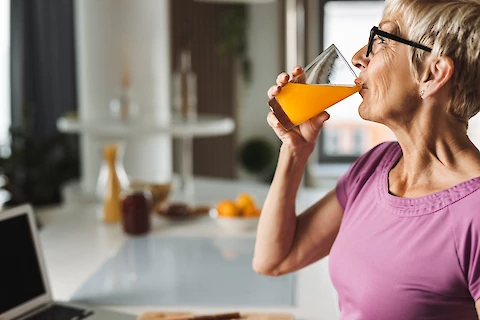
Proper hydration is crucial at every stage of life, but it is especially important for seniors. Our body's water content decreases as we age. This leaves seniors more susceptible to dehydration, a condition that can have serious health consequences. Learn the importance of hydration for seniors, the risks associated with dehydration, and practical strategies to make sure your senior loved one is getting adequate fluid intake.
Dehydration in Seniors
Dehydration is a condition that occurs when an individual doesn't have enough water in their body to carry out normal functions. While anyone can become dehydrated, seniors are particularly at risk. Our sense of thirst diminishes, and kidney function changes as we age. Both of these can contribute to dehydration. Dehydration can escalate rapidly for seniors. It can subsequently lead to urinary tract infections, kidney stones, or even life-threatening conditions like heat stroke. Common signs of dehydration in seniors include dry mouth, fatigue, dizziness, or confusion.
Importance of Hydration for Senior Health
Water, often overlooked, plays a vital role in maintaining health and wellness. It aids in digestion, keeps skin supple, regulates body temperature, and flushes out toxins from the body. Adequate hydration is even more critical for seniors as it can help manage or prevent chronic illnesses like constipation or urinary tract infections, which are common in seniors. Proper hydration also plays a pivotal role in maintaining cognitive function and mental clarity.
Recommended Daily Water Intake for Seniors
While most of us have heard the standard advice to drink eight glasses of water a day, seniors' water needs can vary based on multiple factors. These may include the individual's body weight, their overall health status, and the climate in which they live. Some medications can also impact hydration levels. As a general rule, seniors should aim for about 1.7 liters (around six 8-ounce glasses) of water daily. Of course, it is always wise to consult with a healthcare provider for personalized advice.
Tips for Increasing Fluid Intake
There are several ways to make hydration more appealing and straightforward for seniors even when they don't feel thirsty. Here are a few things you can do:
Keep Amounts Small
Offering small amounts of fluids throughout the day may seem less forbidding to seniors than consuming a large glass of water. Take a bottle filled with water and a straw and carry it with you wherever you go.
Add Flavor
You can also make hydration more enticing by adding flavor to the water with a slice of lemon or cucumber. A cup of aromatic herbal tea is also a good hydrating alternative to water.
Include Water-Rich Fruit and Vegetables
Water isn't the only source of hydration. Many fruits and vegetables, like watermelon and cucumbers, are rich in water content and can help reach hydration goals.
Serve Soups and Broths
Soups and broths can be a warming, hydrating solution in the colder months. It is a tasty way to maintain appropriate fluid balance and is filled with many of the nutrients seniors also need.
Senior Helpers Can Ensure Proper Hydration
Senior Helpers offers quality, in-home senior care services customized to meet the individual needs of seniors in our communities. If you live in the Norristown, King of Prussia, Phoenixville, or Collegeville areas, contact us anytime at Senior Helpers Phoenixville. Our caregivers are trained to monitor signs of dehydration and provide sufficient support to ensure seniors meet their hydration and overall health needs.